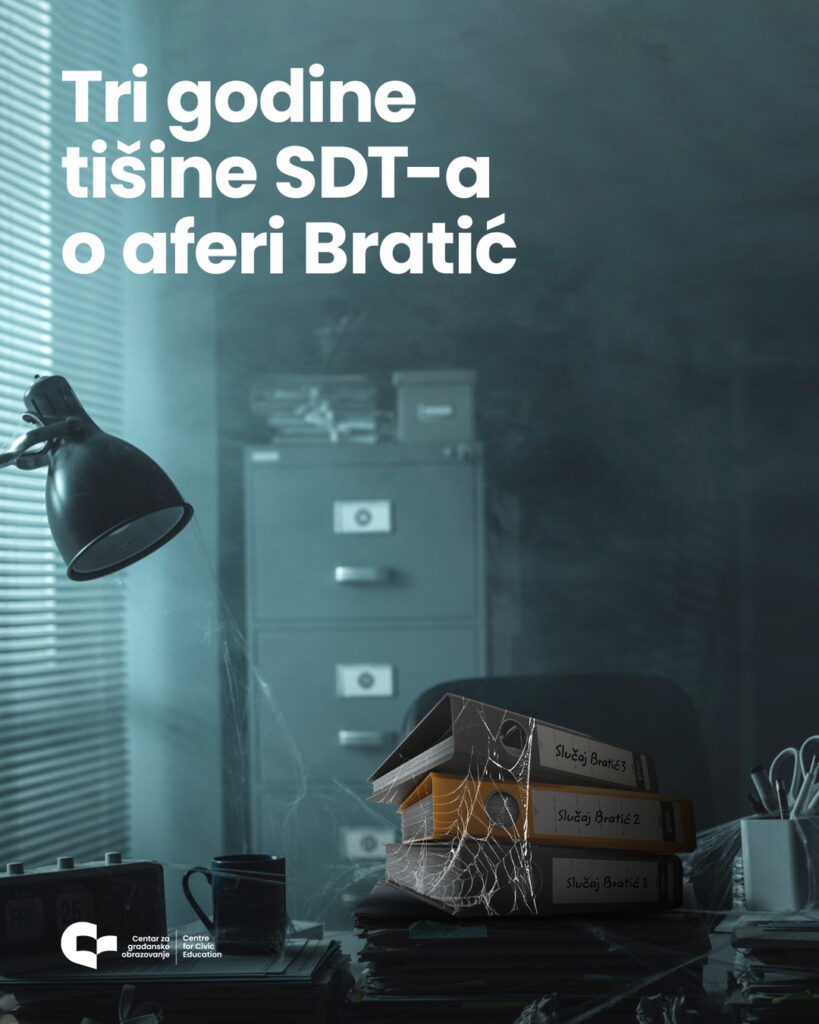The Centre for Civic Education (CCE) reminds that we are entering the third year since the filing of the criminal complaint against the responsible persons in the Ministry of Education, Science, Culture and Sports (MESCS), based on the double negative opinion of the State Audit Institution (SAI). We express concern over the persistent ignoring of this complaint by the Special State Prosecutor’s Office (SSPO), which indicates a selective approach in prosecuting criminal complaints, contrary to the principles of the rule of law.
On 23 September 2022, the CCE filed a criminal complaint to the SSPO, assessing that the double negative opinion of the SAI regarding the management of nearly EUR 220 million (EUR 219,193,714.26) in 2021 by the then responsible persons in the MESCS must be a clear signal for prioritizing this case. The SAI found that the MESCS did not provide a truthful and objective account of the reported revenues and expenditures, and that the identified errors had a material and pervasive effect on the financial statement. In addition, numerous irregularities and inconsistencies in operations were specified, among which we once again recall the most important:
- irregular transfers of funds exceeding €7.6 million, with nearly half of that amount lacking either prescribed documentation or a legal basis for payment, and auditors finding no justification for the remaining half;
- violations of the law in planning the revenues and expenditures of public institutions exceeding €19 million;
- discrepancies in employment records for more than 50% of employees covered by the audit, who received salary increases and were engaged through unlawful supplementary work contracts;
- payments for dual education allowances of nearly €250,000 without the required documentation;
- service expenditures of €1.45 million without proper supporting documentation;
- consultancy contracts worth over €3.5 million without legal basis and proof of results;
- public procurement procedures not conducted in accordance with the law.
In every democratic country, reports from institutions such as the SAI are binding and instructive. The SSPO’s work was further facilitated by the fact that state auditors already had the documentation, testimonies, and expertise necessary to deepen the findings, which the CCE also indicated through additions to the complaint.

The OSCE’s trial monitoring methodology for assessing the importance of a case considers three factors: 1) the status of the accused and their position in society, 2) the gravity of criminal offence, and 3) the prominence of the case in the public domain. In this case, it concerns one of the highest state officials at the time, who still holds an important position at the University of Montenegro and within the bodies of a political party. Furthermore, the estimated damage is in the millions, and the issue received wide media coverage through statements by the CCE, as well as other NGOs, professional associations, engaged individuals, political parties, etc. Accordingly, under the OSCE methodology, this case falls into the category of the most important cases to monitor, given the great public interest in learning the truth about the work of the Ministry’s leadership under Vesna Bratić.
After three years, it is clear that there has been no effective action by the SSPO, despite numerous urgencies by the CCE. Even after the Prosecutorial Council, based on the CCE’s complaint, determined that the acting prosecutor had not acted in a timely manner and instructed her to intensify the procedure, there were no changes regarding this case. According to our information, the case was later reassigned to another prosecutor, but without any visible progress.
Such delays may indicate possible protected status of certain individuals and structures before the SSPO, especially when compared with cases of far smaller budgetary damage where the SSPO reacted much more swiftly. This raises the question of the methodology the Prosecutor’s Office uses to determine which cases to address and at what pace. Namely, it remains unclear whose interests are being protected in this way, as this approach does not serve the public interest.
The CCE expects the SSPO to finally dedicate itself to this case professionally and responsibly, as it is an indisputable matter of public interest, which also shapes citizens’ trust in institutions. Only by establishing the facts and prosecuting those responsible without selectivity can the effectiveness of the work of the Prosecutor’s Office, as a unique and independent body, be ensured – an essential condition for upholding the rule of law.
The CCE will also present a summary of this case to the interested international public monitoring the state of the rule of law in Montenegro.
dr Ivan Vukčević, Human Rights Programme Coordinator
